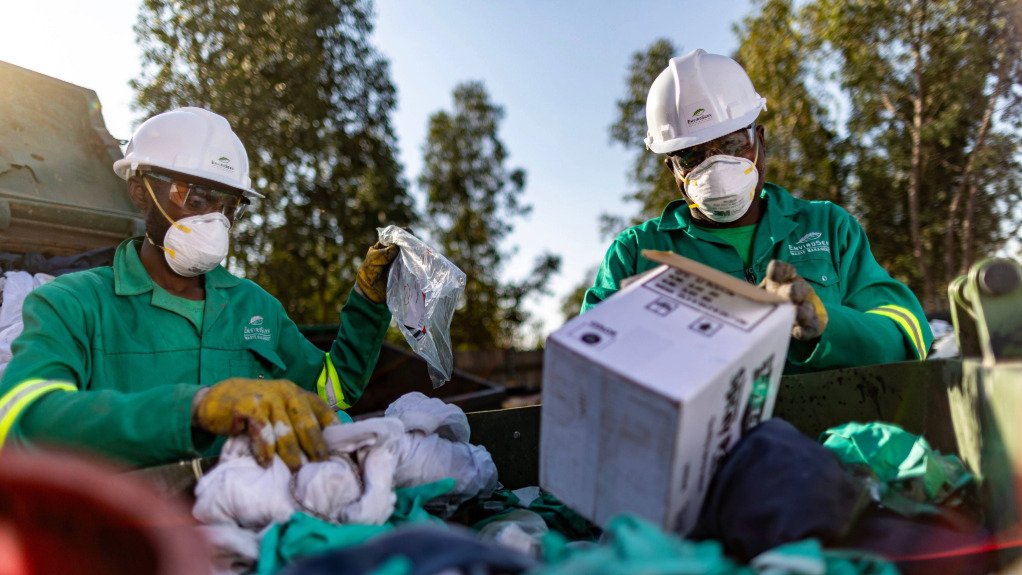As testament to its renewed commitment to sustainability and generating shared value for customers, global waste and wastewater management company EnviroServ has earmarked three key pillars to improve on its sustainability targets.
EnviroServ, a SUEZ company, is in alignment with the global group’s sustainability priorities, focusing on the pillars of climate, nature and social responsibility.
Goals include reducing its greenhouse-gas (GHG) emissions at its waste management facilities by 60% by 2028, doubling the amount of renatured and restored capped landfill areas by 2027, using 100% indigenous species, continued reduction in the frequency and severity rate of accidents and increasing the number of people trained in the workforce by 76% by 2028.
Consequently, EnviroServ is actively contributing to energy decarbonisation by enhancing the sustainable practices at its waste management facilities.
By capping the working face of a landfill as soon as possible, the smallest surface area is exposed to the environment, consequently minimising the risk of odours and landfill gas being released, while reducing the volume of contaminated stormwater and leachate.
“The capping or rehabilitation of a landfill site is done in terms of a closure plan approved by the Department of Forestry, Fisheries and the Environment,” says EnviroServ group technical manager Esme Gombault.
The closure plan includes an engineered cap that comprises several engineered clay layers, geotextile liners and drainage layers, constructed and installed by an independent construction company.
The construction of the final capping of the site should take between four and six months; however, the timeline can be severely affected by rainfall and the process of attaining approvals of the closure plan and capping design from the relevant authorities.
However, advanced planning can limit the impact of rain and approval delays.
The capping layer separates the waste body from the atmospheric environment: “The cap is the layer protecting and isolating the waste from the long-term effects of wind and water erosion and burrowing animals,” she adds.
Further, the cap limits and controls the quantities of precipitation that seep into the accumulated waste material. It should also allow for water to leave the landfill by evapotranspiration and vent landfill gas in a safe manner.
Further, biogas feasibility studies have been undertaken at the waste management facilities of Shongweni in Hillcrest, Chloorkop in Johannesburg and Vissershok in Cape Town, with the company aiming for carbon reductions that it can carbon trade, explains EnviroServ CEO Dean Thompson.
“We also hope to double the volume of landfill gas that is extracted and being flared at the Chloorkop and Shongweni facilities to further reduce emissions,” he adds, mentioning that almost 26 ha of land will be renatured across EnviroServ’s operating sites as the company doubles the amount of land restored by 2027.
Over the same three-year period, the company has committed to not using phytosanitary products in any of its green spaces or facilities: “Instead of using phytosanitary treatments, we plan to initiate a project with the community to manually remove any invasive species,” highlights Gombault.
Targeted Approach
“Through improved training and reporting, we are targeting a 5% improvement in waste sorting efficiency, which is essential in the recovery of recycled waste,” states Thompson.
He says proper separation and categorisation of waste at source minimises the amount sent to landfill, conserving resources and reducing environmental impacts.
Gombault elaborates on the company’s approach to renaturing, describing it as a process of returning natural ecosystems or habitats to their original structure and species composition.
“Renaturing our landfill sites simply means returning areas to nature or restoring it to its normal condition,” she says.
With capping and rehabilitation of completed cells or areas, EnviroServ is returning those areas to nature using local indigenous plant species to vegetate them.
Progress To Date
Thompson says EnviroServ is tracking well against health and safety benchmarks, with the frequency and severity of accident rates already substantially below the targets the company has set for itself.
“We will continue to contribute to the sustainable development of the communities in which we operate, maintaining 50% spend among local small business suppliers and growing development of employees through training programmes, from 63% currently to 76% by 2027.”
He adds that as a business operating in the environmental space, EnviroServ is taking its share of responsibility for the preservation of resources and people, and is working to position the company as “best-in-class”.
The company has started this journey by disclosing baseline figures and will share updates on how it is tracking towards stated targets.
Importantly, these commitments are a “powerful driver” for employees, with EnviroServ proudly declaring tangible results.
“Adapting our sites using international best practice has resulted in a 19% decrease in GHG emissions since 2022, so we have already made a significant stride towards our 60% goal for 2028,” concludes Thompson.
Edited by: Nadine James
Features Deputy Editor
EMAIL THIS ARTICLE SAVE THIS ARTICLE
ARTICLE ENQUIRY
To subscribe email subscriptions@creamermedia.co.za or click here
To advertise email advertising@creamermedia.co.za or click here













